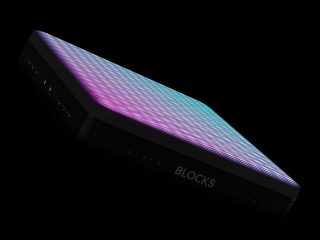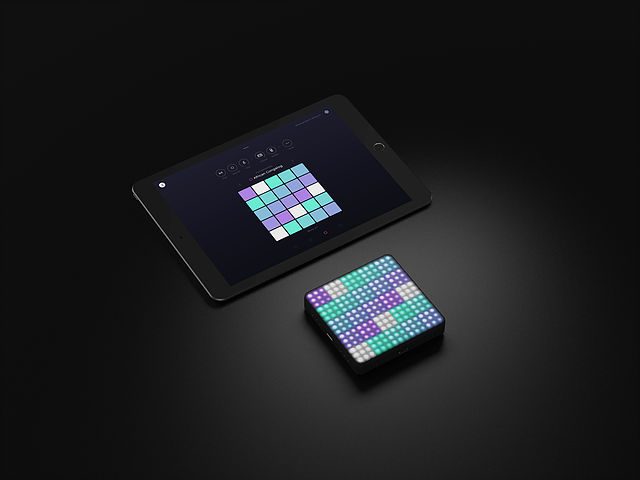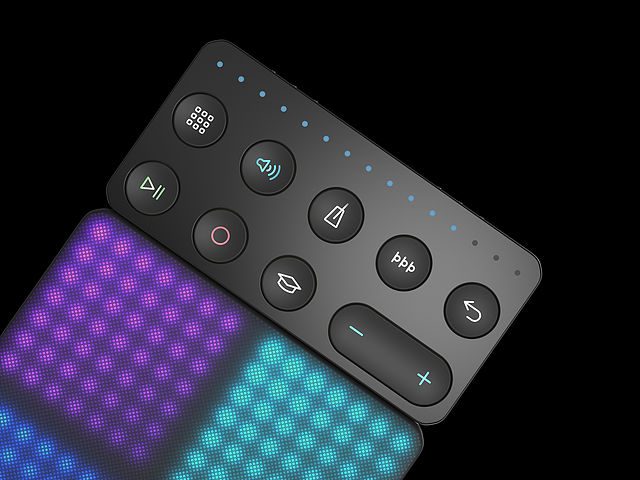ROLI today launched Blocks, a modular MIDI controller system that’s like a LEGO Bricks system for MIDI controllers.
Each individual Block offers unique control capabilities. You can connect various Blocks together to create a custom controller that suits your performance/production style.
Here are the official intro videos:

The Lightpad Block features a tactile, glowing surface that lets people shape music through presses, glides, and other natural gestures.
The Live Block and Loop Block have controls that make it easier to perform and produce in real time.
Blocks is powered by NOISE, a free music app for iPhone and iPad that is now available at the App Store. NOISE connects to BLOCKS wirelessly over Bluetooth, becoming the system’s sound engine as well as a standalone app.

Pricing and Availability
The Lightpad Block, Live Block, and Loop Block are exclusively available at ROLI.com, Apple.com, and Apple Stores around the world. The Lightpad Block retails for US $179 (£169.95) and the Live Block and Loop Block at $79 (£69.95),


ah cool! dig it.
whoa…. (keanu style)
Seems cool, but I don’t totally grasp why you would need what looks like basically a separate hardware touch surface to control an iPad.
velocity, for one thing… probably aftertouch as well.. who knows
it does say pressure and slides, so perhaps it’s an XY pad with pressure and that’s it? If it had a standard midi cord (included or as an option) it would be an awesome extra control surface for ANY hardware synth especially things like Minilogue which have full midi in specs.
definitely better to always have MORE control CCs on hand and in an ergonomic setup like an XY pad i say. I love the xy controllers on certain older synths too like korg Z1.
That’s a good point. Technically all it would take would be another module to snap on with midi in/out. It’s probably a future road map considering everything is plug and play with an iPad… for now.
I thought Ipad pro had pressure sensitivity already. The expectation would be that this will be made obsolete by a 99c app in 1-2 years…
i think the point is that you don´t need an ipad to play it…(edit: seems you need at least an iphone if i get that right…)
but i really like the idea of putting more of those block together and the whole concept looks quite interesting.
reminds me a bit of the kaossilator with some teenage engineering flavor…
but hey what´s that cooperation with apple…i don´t get that!
ever try using the iPad surface for game play
not very good for some
same for some music apps
on a scale of 1 to 10 how painful is it?
play on the words “LEGO” that i read in the first line of post
oh…its a ‘controller’…you need to spend an extra £700 on an ipad
nah..behringer deepminnd 12 is better value by far and won’t be unusable
in 3 years when they drop the app from the apps store.
You certain that Behringer won’t be unusable in three years?
you don’t think it would be a blast to plug 1 or 2 of these into a Prophet 6 or other big poly synths and add all kinds of modulation on the fly as you strum chords or play lines with the other hand?
but its bluetooth only.
i wonder if Bluetooth is a redneck invention
like you know if you are redneck when you are told to brush your tooth
Looks to hipster for me, plus it takes out the learning in music.
Two negatives that you’ve mentioned are actually the main selling points of these devices 😉
500 bucks for all four, can I get something else more interesting instead?
Not really, everything else on the market looks quite boring in comparison 😉
unless beer is involved
It’s cool but seems like a cash grab. Why doesn’t the Lightpad block just come with the loop/live part attached to the top? Actually, a better question is what functionality do the snap-on button blocks (loop and live) bring that couldn’t just be part of the Noise app? Making it more modular than it needs to be is obviously a way to milk you. I’d prefer it was just the light pad with IAP for new app features.
Give me OSC compatibility to make my own midi controllers with Max/MSP and I’m in
That was my first thought: Is it compatible with Max and Pure Data? If not, I pass
Paris Hilton will love it.
name 2 places you like to spend the night in?
Touch components for touch displays? Revolutionary like controlling synthesizers with a keyboard
:p
I like the interface but a bit disappointed that it’s iOS dependent.
I think it looks awesome. I want one for sure! Been playing with the app and its fun. It needs to be able to import my own sounds/samples though.
I work in an Apple Store and had the chance to test it for the past two days. First of all, the blocks are velocity sensitive and pressure sensitive. Think of it as a square shaped rubber surface that you can use to trigger the sound either with a brief touch or a long harder pressure on it. Pretty much like after touch on a synth if you prefer. I just found the amount of pressure needed a bit tirering for the fingers after 5 mn of playing, but it does the job. Looking at the sides of the device, there was no midi in/out. Just what seemed to be a USB-c connector for charging the device. The connection is Bluetooth and you connect it on an IOS device (iPad, iPhone, iPod touch) thanks to the ROLI app named NOISE. I am afraid that there is no other possibility to connect the device to another app or software so far, making it a bit disappointing considering that the NOISE app is fun to use but quite limited in terms of sound bank. There is probably 50 presets available only.
Overall, I found it interesting on presets like “Overdrive Guitar Feedback” because you can play long legato with vibrato (by moving your fingers on the sides of the note) and resonance (by pushing harder of the device) and slide the note up or down as well. But I was not convinced at all by the Drum presets, since it doesn’t recognise light pressures. I needed to hit the device with an already moderate velocity for it to trigger something, making it hard to play with groove. If you want to play some shadow notes in between, it pretty much doesn’t “feel” the light pressure. The only thing that works is the rolls by pushing a note and sliding upward to increase the volume of the snare roll or hihat roll.
There are two play modes: the first one is a loop mode in which the device lights up like a mini Ableton Push so you can start and stop the loops by pushing the corresponding squares. The second one is the Instrument mode where you can play as described above.
I don’t know if Roli plans to make the device compatible with any DAW or Virtual Instrument (which would be amazing, let’s say it) but for the time being, with the limitations I encountered as a musician, I got bored of it. There is apparently no way to edit the sound patch or the effects in NOISE. You can only change the tempo, scales, arpeggiator. So it makes it a music gadget in my opinion. If at least they would offer the possibility to connect it to a real analog synth with a software to map the modulations to any MIDI CC parameter, I would instantly buy it.
I guess I will wait for the Expressive E “Touché” to be released to get something close to that.
Hi Nico, Thanks for your post about ROLI’s Lightpad Block and NOISE. As always, we’re happy to receive your thoughts and feedback. I just wanted to take this opportunity to respond to a few of your comments about the Lightpad Block and NOISE.
The USB-C connector on the Lightpad Block is for charging and additional connectivity. You can use the Lightpad Block to connect to a computer and when not paired with NOISE, it will output MPE MIDI data. On a Mac it can also be connected over Bluetooth. There is a growing list of software synths listed below that are MPE compatible including Equator.
There are devices such as the Expert Sleepers FH-1 which can convert MPE MIDI data into analog CV’s for interfacing with a modular system. The Lightpad Block also works with other iOS apps that support MIDI-over-Bluetooth and MPE such as Animoog.
In addition to the presets included with NOISE, there are three legacy soundpacks available to NOISE v1 creators and four soundpacks of sixteen presets each redeemable when registering a Block (98 total). We intend to continuously update and release new presets regularly – including artist sound packs – which will be available directly from the NOISE app. In addition, NOISE.fm makes it possible to share NOISE projects with other users and will soon offer the ability to colalborate on and remix projects with others.
The links below lead to detailed explanations of the topics above. Please don’t hesitate to contact us at support.roli.com if you have any further questions. Have a great day.
Use the USB-C port to connect a Lightpad Block to a computer.(https://support.roli.com/article/using-the-lightpad-block-with-desktop-apps/)
What is MPE?
(https://support.roli.com/article/what-is-mpe/)
Connecting to a Mac via Bluetooth
https://support.roli.com/article/connecting-by-midi-over-bluetooth-osx-devices/
MPE Compatible desktop and plug-in synths
(https://support.roli.com/article/mpe-compatible-synthesisers/)